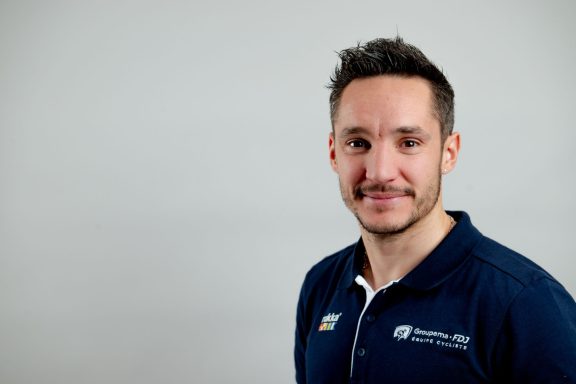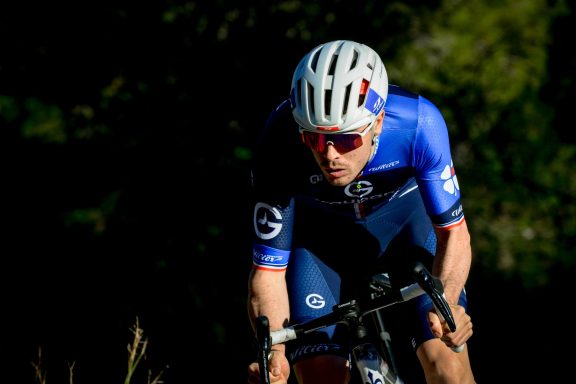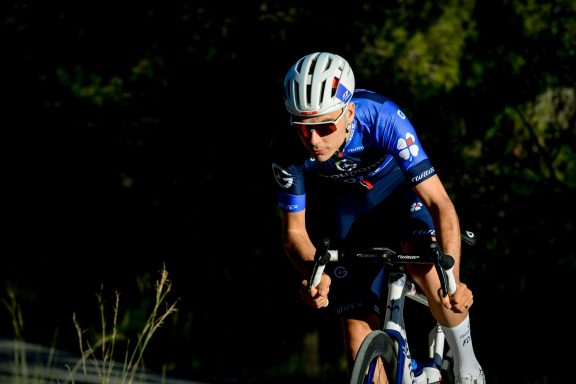Unlike his teammates, William Bonnet hasn’t yet had a chance to race this season. And like them, he will have to wait several more weeks before putting on a bib again. However, at almost 38 and full of past experiences, he would rather be optimistic and relaxed than impatient. Also, without foreshadowing anything for the future, the Frenchman keeps showing a resolute motivation. We sat down for an interview with the “big brother” of the Groupama-FDJ cycling team.
William, how do you deal with this exceptional situation which is going to last?
Psychologically, pretty much like everyone else. Physically, I try to stay fit like most of my colleagues. I usually do GPP (General Physical Preparation) then a session on trainers right after, with different themes to make it a little more fun, whether with speed, strength sessions, or thanks to virtual platforms like many do now. All this fills the morning up. I also have three children, and we have to keep them busy, play with them, help them with their homework, which has been the hardest thing to handle so far (laughs). I also have some maintenance to do at home. We fill in the time as we can but we don’t lack activities and the days ultimately go by quickly enough. I am fortunate to live in a house and to have a garden. Some are certainly more to be pitied.
“An opportunity to put all the cards on the table”
With your 16 years in the pros as a background, how do you analyse this career period?
Actually, it was complicated mostly when we didn’t really know what and when the end of it would be. Every day, we learned new things about what happen. Sometimes these same things were denied. Today, we know that the Tour will start at the end of August, that the national championships will be held just before and the Worlds just after. For the rest, there is nothing official. We update the situation day by day. The key is that you shouldn’t panic, you have to look further than the day after. You have to be optimistic in spite of everything and especially not to fall into the doom and gloom thinking that we are never going to get out of it. Because we’re going to get out of it, it’s not going to last all year. At least, I hope so. Otherwise, it would be truly dramatic, far beyond sport. You have to trust those who lead, who make the decisions. We can agree or disagree, but I think that we must respect what is decided and that everyone should go in the same direction.
Can this be compared to any other moment of a cycling career?
If we want to compare this to personal experiences, not racing for that long can certainly be assimilated to a long injury. I personally have known some, especially in 2015. However, it is still very different, as you generally know the duration of your injury and the time it takes to recover. In the present case, we were much more uncertain until now. We were wondering what our calendar might look like, what races would be organized, maintained, postponed … We were more in the dark than in the case of a traditional injury. It is a little clearer now that we know Tour’s dates, but we do not know when we will resume racing, if there will be any races before, like the Critérium du Dauphiné. There are still a few points to be cleared up, but it is still obvious that the recent announcements have made it possible to set a real target.
You had a small knee operation earlier this year. Do you see this break as a “chance” to get back on track?
I think that everyone should see this period, not as a blessing, but as an opportunity to put all the cards on the table and recharge the batteries. In the past, we have often seen athletes getting injured and having to stop their season. It didn’t stop them, later on, from coming back to a very high level and sometimes with renewed strength, energy and motivation. You just have to accept the situation and try to make the most of it. This forced break should allow us to find freshness and revitalize ourselves so that, when the season resumes, we could be at our best physical level and perform well.
“It is important to find interests beyond cycling”
Does your experience enable you to live this situation with more calm?
Those who have not had an injury or extended break may be more worried and have more questions. Like: “Am I going to get my level back?” Once you have experienced it, you actually know that as professional athletes, we have the ability to return to our previous level without any real problem. Knowing it is an advantage, and the message must be passed on to those who may be more concerned. But, in the team, someone like Thibaut [Pinot] is very aware of all this. He had been sidelined for a long time after the Giro 2018 and that did not prevent him from having a very good end of the season (victories at Milano-Torino and at Il Lombardia, note). We talked a lot together about this topic, about this fear of missing a training phase, of being delayed in the preparation, but we realized that it was not an end in itself. Many need to experience and live it to realize it, but an extended break does not in any way end a career, neither does it lower one’s level on the long term nor stop a progression.
Is your “big brother” role in the team also important in this period?
My role is mostly useful when we are all together. Of course, we have little chats, I’m in contact with a few of the team’s riders, but everyone also has their own activities at home. We are in touch to meet on Zwift, to do a few sessions together, but we do not necessarily talk about the current situation. When we have a chat, we try to talk about something else. It also depends on each rider’s mindset. For some, cycling is the priority at the moment, for others it is not. From the moment you have a family, the priorities are not necessarily the same. When you are young, you think of cycling all day long and you have almost nothing else to do. In this case, the days may seem a little longer indeed. This is why it is important to find interests beyond sports, whether together or individually, to stay busy and refresh our mind in relation to everything that is going on currently. Anyway, I know that the staff is there for every rider who needs it. The sports directors regularly call all the riders and not a week goes by without being in touch with them. They’re here for any special request.
How do you cope with riding on stationary trainers?
Personally, I couldn’t do five-hour sessions as I have seen some do. I think this is useless, especially in the current period and when you know that racing may not resume before August. I see some who do 25 hours on trainers a week. What is the point? Well, if that makes them feel good, good for them, but I think it is not useful physically speaking. As far as I am concerned, I do 1h30, two hours max, but that’s it. After that, I can’t take it anymore. Obviously trainers can’t substitute sensations we have on the road, but we are all on the same boat and we have no choice. I’m not considering going outside. It’s forbidden and I think it’s a good thing, even for a top athlete. Hospitals are already quite overcrowded. I saw that some amateur cyclists went for a ride and had accidents. This is an additional constraint for hospital services and I think they don’t need that right now … Road training will resume when we’ll get the green lights. Until then, we have to deal with it but I’m not worried about the resumption.
“I’m focused on the present”
Has the current situation also allowed you to think more deeply about the months and years to come?
Are we talking about retirement (laughs)? Some understand it, others don’t, but I don’t think about what I’ll do next at all. Neither do I think of stopping at the moment. It isn’t my state of mind at all. In the winter, when I resume training, my only goal is to prepare myself as well as possible to be able to perform well for the coming season and to be able to bring something to the team. Then comes the time to take stock at the end of the year, to know if the team has been satisfied, if they still count on me for the following year and if, for my part, I still feel able to make the required efforts on a daily basis, with the training and all the sacrifices related to our job. I’m focused on the present, training and cycling. I’ll think about it when the time demands it, when the time comes to make a decision, or when my body has finally let me down.
This strange 2020 season won’t have an influence on your decision?
We should still have some races at the end of the season, even if we don’t really know which ones. In any case, I am not considering stopping at the moment. So much so that it’s today difficult for me to think about it, to express myself on the matter and to project myself. If at the end of the season, when the time comes, I feel that it doesn’t go well anymore or that the team is no longer satisfied with what I can bring, it will be time to draw the conclusions. In the meantime, it’s not on the agenda. The current context and circumstances have nothing to do with this thinking process. With the team, we are linked until December 31 and whatever happens, I will remain available until that date for them. Then we’ll see what happens at the end of the year.
“A very strong bond unites me to the team, and that goes beyond my personal case”
At almost 38, what keeps you going?
Mainly, the environment I’m in, meaning the team. If it weren’t for a good group and a good general atmosphere, I would certainly struggle more to train and to go on the races. Right now, I still enjoy meeting with all the riders and the staff. I still fancy being on the move and I also know that I have Marc, the coaches and the sport directors’ confidence. This trust they have given me over the past few years, which have not always been simple and easy for me, I kind of want to return it by continuing doing the sacrifices to make the most of my enthusiasm and my capacities, if it can still help the team. Then, obviously, the project, the goal and the ambition with Thibaut for the Tour de France also push me to try to be there and perform at my best for him. But as I said to Thibaut, and to some of the others on the team, I know that I am not going to last forever. The years go by, and if by chance I was not up to the task and someone took my place, which by the way is not “mine”, that would not be a problem for me. If the choice is made for the sake of the team and that it enables them and Thibaut to perform, to shine, that suits me perfectly. A very strong bond unites me to the team, and it goes beyond my own ambition and my personal case.
How do you anticipate the next few weeks?
Currently, I’m just trying to stay fit and racing shouldn’t resume until August. For those who target the Tour, it is now easier to set a return date and an adjusted program, but it will only concern eight riders. At this point, the others don’t know much more. We don’t know yet where the Giro, the Vuelta and the five Monuments will be moved. We will have to wait a bit but we have four months to go before the resumption. By then, it will surely be clearer. We also should be able to start going back on the road in May, if everything goes in the right direction, obviously. From there, we’ll then get back to real training. This will leave us more than two months before the first possible races. It is only when the lockdown will stop that it will again be necessary to seriously get back to the objectives, to refocus on training and on real build-up.



No comment